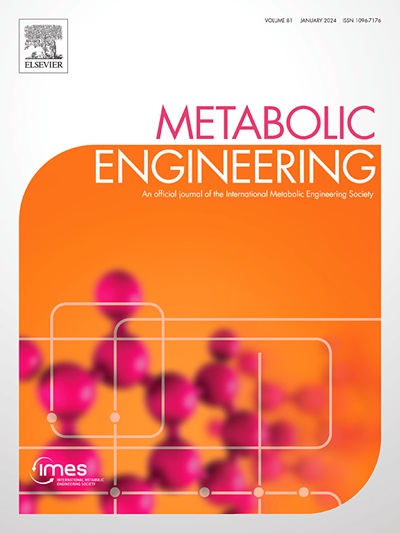Enabling genetic manipulation and robustness of Bacillus methanolicus for methanol-based bio-manufacturing
IF 6.8
1区 生物学
Q1 BIOTECHNOLOGY & APPLIED MICROBIOLOGY
引用次数: 0
Abstract
Methanol-based biomanufacturing holds great promise for sustainability but is currently limited by the slow growth and low efficiency of natural or synthetic methylotrophic strains. In contrast, the thermophilic methylotroph Bacillus methanolicus exhibits rapid growth, high-temperatures tolerance, and efficient methanol utilization in defined mineral medium, making it a promising candidate for industrial applications. However, its potential is constrained by reluctant genetic modification and suboptimal robustness under fluctuating methanol concentrations. To address these limitations, we developed a comprehensive genetic manipulation system that includes an improved transformation approach, a homologous recombination-based knock-out/knock-in method, a constitutive promoter library spanning a 600-fold range of strengths, and an stringent xylose-inducible promoter with a wide dynamic range. Using these enabling tools, we enhanced the robustness of B. methanolicus under varying methanol concentrations by introducing a xylose pathway, which buffered intracellular formaldehyde accumulation. Co-utilization of methanol and xylose achieved a molar consumption ratio exceeding 4:1, indicating methanol served as the primary carbon source while xylose was auxiliary to enhance robustness. Subsequently, we developed a riboflavin cell factory by systemic engineering of B. methanolicus, achieving 2579 mg/L production in a 5-L bioreactor—the highest riboflavin titer reported for methanol-based production. This study establishes B. methanolicus as a versatile and accessible platform for sustainable methanol-based bio-manufacturing.
使甲醇芽孢杆菌的遗传操作和健壮性为甲醇基生物制造
以甲醇为基础的生物制造具有可持续性的巨大希望,但目前受到天然或合成甲基营养菌株生长缓慢和效率低的限制。相比之下,嗜热嗜甲基化芽孢杆菌(Bacillus methanolicus)生长迅速,耐高温,在特定矿物介质中高效利用甲醇,使其成为工业应用的有希望的候选菌。然而,它的潜力受到不情愿的基因修饰和波动甲醇浓度下的次优鲁棒性的限制。为了解决这些限制,我们开发了一个全面的遗传操作系统,包括改进的转化方法,基于同源重组的敲除/敲入方法,跨越600倍强度范围的组成启动子文库,以及具有宽动态范围的严格木糖诱导启动子。利用这些工具,我们通过引入木糖途径来缓冲细胞内甲醛积累,从而增强了B. methanolicus在不同甲醇浓度下的稳健性。甲醇与木糖共利用的摩尔消耗比超过4:1,说明甲醇是主要的碳源,木糖是增强鲁棒性的辅助碳源。随后,我们通过甲醇双球菌的系统工程开发了一个核黄素细胞工厂,在一个5-L的生物反应器中实现了2579 mg/L的产量,这是甲醇生产的最高核黄素滴度。本研究建立了B. methanolicus作为可持续的基于甲醇的生物制造的多功能和可访问的平台。
本文章由计算机程序翻译,如有差异,请以英文原文为准。
求助全文
约1分钟内获得全文
求助全文
来源期刊

Metabolic engineering
工程技术-生物工程与应用微生物
CiteScore
15.60
自引率
6.00%
发文量
140
审稿时长
44 days
期刊介绍:
Metabolic Engineering (MBE) is a journal that focuses on publishing original research papers on the directed modulation of metabolic pathways for metabolite overproduction or the enhancement of cellular properties. It welcomes papers that describe the engineering of native pathways and the synthesis of heterologous pathways to convert microorganisms into microbial cell factories. The journal covers experimental, computational, and modeling approaches for understanding metabolic pathways and manipulating them through genetic, media, or environmental means. Effective exploration of metabolic pathways necessitates the use of molecular biology and biochemistry methods, as well as engineering techniques for modeling and data analysis. MBE serves as a platform for interdisciplinary research in fields such as biochemistry, molecular biology, applied microbiology, cellular physiology, cellular nutrition in health and disease, and biochemical engineering. The journal publishes various types of papers, including original research papers and review papers. It is indexed and abstracted in databases such as Scopus, Embase, EMBiology, Current Contents - Life Sciences and Clinical Medicine, Science Citation Index, PubMed/Medline, CAS and Biotechnology Citation Index.
 求助内容:
求助内容: 应助结果提醒方式:
应助结果提醒方式:


